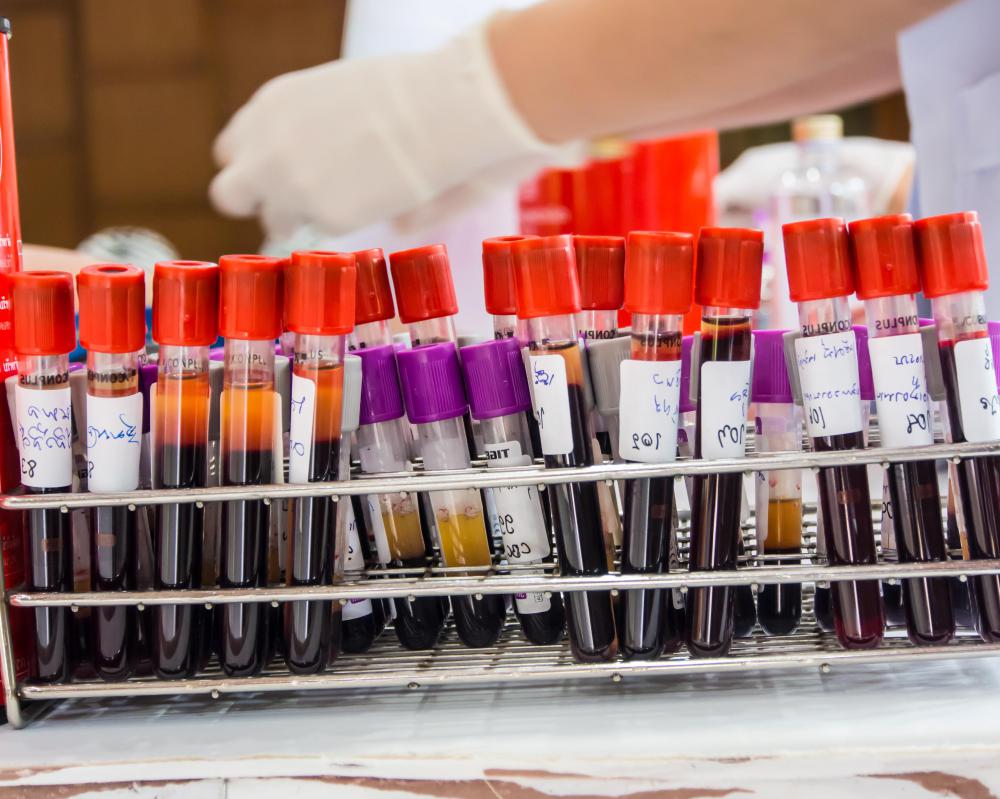At WiseGEEK, we're committed to delivering accurate, trustworthy information. Our expert-authored content is rigorously fact-checked and sourced from credible authorities. Discover how we uphold the highest standards in providing you with reliable knowledge.
What are Antiretroviral Drugs?
Antiretroviral drugs are drugs which are designed to combat retroviruses. These unique viruses pose distinct challenges to medical professionals, and finding effective drugs to treat them has been a difficult task. The most famous retroviruses are Human Immunodeficiency Virus (HIV) and Acquired Immune Deficiency Syndrome (AIDS). These viruses are notoriously difficult to treat due to their adaptability and insidious nature.
A retrovirus is enveloped in RNA, and it uses an enzyme called reverse transcriptase to turn the RNA into DNA. This converted DNA merges with the cell that the virus occupies, infecting the cell and ensuring that the harmful DNA will spread when the cell divides. This clever attack method makes the virus difficult to dislodge once it has taken hold, and it leads to a multitude of symptoms, since these viruses attack the immune system directly, rather than the body.

In order to successfully combat retroviruses, an antiretroviral drug must attack the mechanisms which allow them to replicate and take over. There are a number of different antiretroviral classes, all of which focus on different stages of the duplication of the virus. Since the viruses tend to mutate very quickly, many patients are forced to take a unique cocktail of drugs which addresses their specific infection. When a combination of drugs is taken, it is known as Highly Active Anti-Retroviral Therapy (HAART).

Although antiretroviral drugs can discourage replication and halt the progress of the disease, they cannot cure it entirely. This can be frustrating for patients, as they may have to take HAART for their entire lifetimes to ensure that the disease is kept at bay. This can also be challenging for physicians, as they may need to make subtle adjustments to dosages and medications to keep the antiretroviral drugs effective. Failure to complete a regimen can lead to increased drug resistance, which is harmful for all humans as well as the patient.

In addition to requiring a lifetime commitment, the drugs also come at a high price, literally and figuratively. Thanks to high demand for antiretroviral drugs in developed countries, many pharmaceutical companies have developed a wide range of drugs, all of which are very expensive. Attempts at making cheaper therapies available in developing nations have been met with substantial opposition. The drugs also have intense side effects, some of which can get so severe that the patient wonders if he or she might be better off with an active infection.

When antiretroviral drugs are prescribed, it helps to pick a health care provider and stick with him or her. Every doctor has a slightly different approach to retroviral infections which includes the patient's unique health history and experience on antiretrovirals. Keeping all of these medical records in the same place ensures a high quality of care for the patient.
AS FEATURED ON:
AS FEATURED ON:

















Discussion Comments
The treatment of HIV is not all about popping pills. My friend has a cousin infected with the HIV virus. He has to adhere to a strict diet or he could get very sick just from the foods he’s eating. A medium-rare steak or seared tuna is enough to send him to the emergency room. For him, antiretroviral therapy meant a complete change in lifestyle.
@babylove - Anything that isn’t FDA approved is a risk factor people are willing to take. Look at all the Herbalists who’ve been successful at selling alternatives to medicine for years. They’re products are seldom ever FDA approved and there’s no crack down on the claims they make.
I’m not defending these guys. I’m just saying that the product they’re marketing seems harmless and most likely ineffective. It appears to be nothing more than a tube of fluoride that’s rubbed on the skin.
If it really were a cure, I doubt there would be any toothpaste left on the shelves. People are smarter than that.
I am so tired of people who are out to make a profit over other people’s misfortunes. The headlines came up a few weeks ago about the Feds cracking down on bogus pills from makers who claim they will cure HIV.
There is no cure for this disease as of yet. And the only treatment these poor souls have is the breakthrough of antiretroviral medications which they can only get by prescription.
I’m sure a lot of you who are infected are vulnerable and even desperate to cure your symptoms of HIV, but taking anything other than what is prescribed by your physician, I think, should be carefully scrutinized including supplemental vitamins.
Remember how weak your immune system is. You shouldn’t take any pills you can buy over the internet without your doctor’s approval.
Post your comments